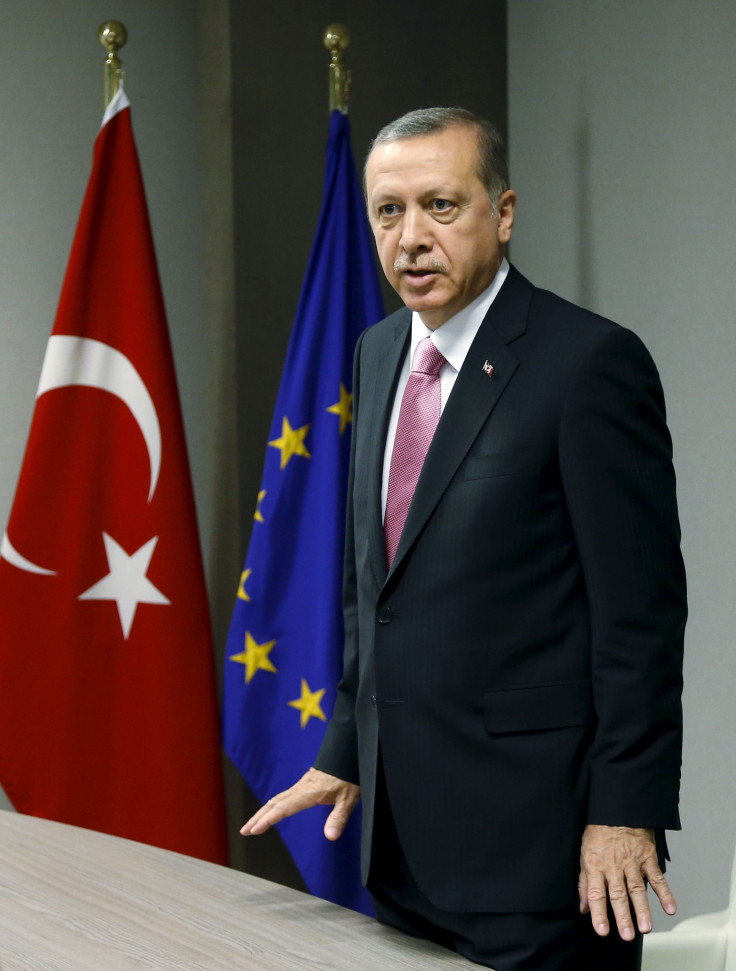Europe Refugee Crisis: EU Hopes For Turkey's Help At Brussels Summit To Tackle Migrant Influx

UPDATED 2:30 p.m. EST: European leaders late Sunday confirmed a deal had been reached. Reuters quoted EU President Donald Tusk of Poland as well as German Chancellor Angela Merkel and the EU's Jean-Claude Juncker. Turkish Prime Minister Ahmet Davutoğlu said the EU and Turkey had agreed to two summits a year pls additional high-level talks. Agence France-Presse also reported a deal had been reached.
#BREAKING EU, Turkey agree 3 billion euro aid deal to stem migrant crisis, Tusk says
— Agence France-Presse (@AFP) November 29, 2015
UPDATE: 6:15 a.m. EST -- European Union leaders and Turkey reportedly drew up an initial agreement that offered Ankara 3 billion euros ($3.2 billion) in cash to manage the refugee crisis, and resumed stalled talks on Turkey’s European Union membership.
"Both sides will, as agreed and with immediate effect, step up their active cooperation on migrants who are not in need of international protection, preventing travel to Turkey and the EU, ensuring the application of the established bilateral readmission provisions and swiftly returning migrants who are not in need of international protection to their countries of origin," according to a draft seen by Reuters.
The EU also said it may lift visa restrictions for Turkish citizens traveling to the bloc from October 2016 if Ankara meets certain criteria specified in an agreed roadmap, the draft reportedly said.
#EU preparing #Turkey migration deal: 3bn€,more accession talks,visa-free travel.But reluctance to reward govt amid concerns for rule of law
— Mark Lowen (@marklowen) November 29, 2015Original story:
Leaders of the European Union aim to secure an agreement from Turkey to halt or slow the flow of refugees to Europe in exchange for about 3.2 billion euros ($3.38 billion) in cash and closer ties with the EU. The deal is reportedly expected to be struck Sunday at a summit in Brussels.
As EU member states look for ways to stem the influx of refugees -- more than a million people arrived in the bloc this year according to several estimates -- Turkish President Recep Tayyip Erdoğan has set a high price for his cooperation: the easing of visa requirements for Turkish citizens travelling to the EU, resumption of EU membership talks, regular EU-Turkey summits, along with the financial aid for supporting refugees.
Diplomats speaking to Reuters said the 28 states had struggled through Saturday to agree on a final offer as Ankara was driving a hard bargain. This is reportedly the first time all 28 member states have participated in a full summit with a non-member of the union.
“The amount of money we’re offering is ludicrous,” an ambassador from one of the bigger countries in the EU told the Guardian. “We’re on our knees begging the Turks to close their border.”
EU wants Turkey to use the money to support 2.3 million Syrian refugees currently living in Turkey so they are less inclined to take a boat to nearby Greek islands in an attempt to migrate to Europe. The bloc also wants Ankara to make the journey tougher for refugees from other parts of the world looking to use Turkey as a stepping-off point for Europe.
In recent months, a burgeoning crisis -- the worst since World War II -- has unfolded in Europe, which is struggling to accommodate hundreds of thousands of refugees fleeing conflicts in the Middle East and Africa.
However, as member states face mounting pressure back home to clinch a deal, skepticism was reportedly running high among policymakers in Brussels about striking a deal with Erdoğan, who has been criticized for his human rights record and crackdown on press freedom.
And despite calls from European and Turkish activists to not ease pressure on Ankara over the arrest of another two journalists in Turkey this week, EU diplomats reportedly said human rights concerns were unlikely to feature much in the talks Sunday, which may be further complicated by Turkey's downing of a Russian fighter jet near the Syrian border last week.
“Do you know anyone who believes Erdoğan will deliver?” a senior diplomat told the Guardian, while a top EU policymaker said the EU was "trapped."
© Copyright IBTimes 2024. All rights reserved.





















